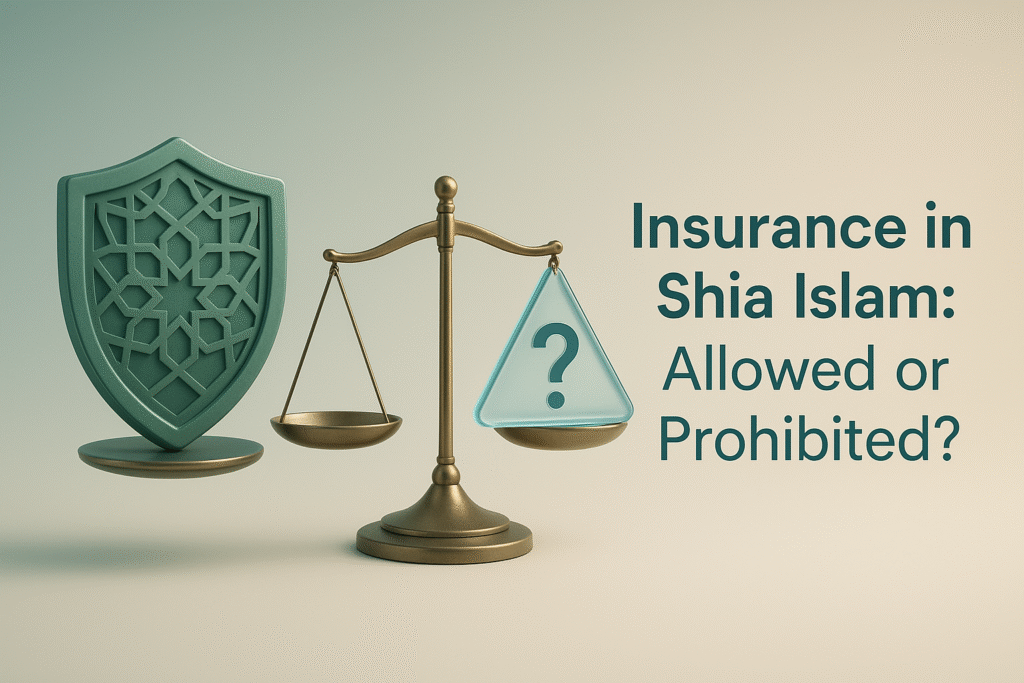- Introduction: Navigating Risk in the Modern World
- The Core Objections: Why Conventional Insurance is Problematic
- The Problem of Gharar (Uncertainty)
- The Problem of Maysir (Gambling)
- The Problem of Riba (Interest)
- The Islamic Alternative: Understanding Takaful (Islamic Insurance)
- The Principle of Ta’awun (Mutual Cooperation)
- How Takaful Operates: A Model of Shared Responsibility
- Guidance from Shia Marjas: Diverse Perspectives on Insurance
- The View of Ayatollah Ali al-Sistani
- The View of Ayatollah Ali Khamenei
- The Principle of Necessity (Darurah) in Insurance
- Practical Scenarios: Evaluating Different Types of Insurance
- Life Insurance
- Health and Medical Insurance
- Car and Property Insurance
- Debunking Common Misconceptions About Insurance
- Conclusion: Choosing Prudence with Principle
- Frequently Asked Questions (FAQ)
- References and Further Reading
Introduction: Navigating Risk in the Modern World
In an uncertain world, insurance has become a cornerstone of modern financial planning, offering a safety net against unforeseen events like accidents, illness, or natural disasters. However, for a Shia Muslim, the question arises: does this modern tool of risk management align with the divine principles of Islamic law? The permissibility of insurance in Islam is a complex issue that sits at the junction of commerce, ethics, and faith. Conventional insurance models often contain elements that are fundamentally at odds with Islamic jurisprudence, leading many scholars to deem them haram (forbidden). This article delves into the Islamic ruling on insurance, examining the core objections, exploring the halal insurance alternative of Takaful, and providing clear guidance based on the fatwas of leading Shia scholars. Our goal is to help you navigate this modern necessity without compromising your religious principles.
The Core Objections: Why Conventional Insurance is Problematic
Islamic scholars have raised several serious objections to the structure of conventional insurance contracts, primarily focusing on three prohibited elements: Gharar, Maysir, and Riba.
The Problem of Gharar (Uncertainty)
Gharar refers to excessive uncertainty, deception, and risk in a contract. In a conventional insurance policy:
- Uncertain Outcome: The policyholder pays a premium for a future benefit that is uncertain. They may pay for years and never make a claim, receiving nothing in return. Conversely, they might make a claim very early, receiving a payout far exceeding their premiums.
- Uncertain Terms: The exact value of the claim, the circumstances under which it is paid, and the complex clauses within the policy can be ambiguous, leading to disputes and a lack of transparency.
This level of uncertainty violates Islam’s requirement for clear and transparent terms in financial agreements.
The Problem of Maysir (Gambling)
Maysir is akin to gambling, where one party gains at the total loss of another. Insurance can be viewed as a gamble:
- The policyholder is essentially betting that an adverse event will occur.
- The insurance company is betting that it will not.
- One party’s gain (the payout) is directly tied to the other party’s loss (paying out the claim).
This speculative nature mirrors the zero-sum game of gambling, which is strictly prohibited in the Quran.
The Problem of Riba (Interest)
Most conventional insurance companies invest the premiums they collect in interest-bearing bonds, securities, and loans. This means the company’s wealth, and by extension the potential payout pool, grows through Riba. Even if a Muslim’s direct premium avoids Gharar, their money is being used to facilitate a system built on interest, making them indirectly complicit in a forbidden activity.
The Islamic Alternative: Understanding Takaful (Islamic Insurance)
In response to these issues, the system of Takaful (which means “mutual guarantee”) was developed as a Sharia-compliant alternative.
The Principle of Ta’awun (Mutual Cooperation)
Takaful is not based on buying and selling risk but on the Islamic principle of Ta’awun—mutual cooperation and bearing one another’s burdens. It is a system where a group of participants agree to contribute money into a common pool to guarantee each other against loss or damage.
How Takaful Operates: A Model of Shared Responsibility
- Contributions (Not Premiums): Participants make contributions (tabarru’, meaning “donation”) to a shared fund out of a spirit of cooperation.
- Sharia-Compliant Management: A Takaful operator manages the fund strictly according to Islamic principles, investing only in halal businesses (avoiding alcohol, gambling, interest-based finance, etc.).
- Payouts from the Shared Fund: When a participant suffers a defined loss, they receive a payout from this shared fund to cover their damages.
- Surplus Distribution: Any surplus left in the fund after covering claims and operational costs is not taken as profit by a company but is returned to the participants. This eliminates the element of gambling and profit from others’ misfortune.
Guidance from Shia Marjas: Diverse Perspectives on Insurance
The views of scholars on conventional insurance vary, reflecting the complexity of the issue.
The View of Ayatollah Ali al-Sistani
Ayatollah Sistani has expressed that commercial insurance, particularly life insurance, is problematic due to the elements of Gharar and Maysir. He has generally considered it impermissible. However, he has made concessions for certain types of insurance (like car insurance) when it is compulsory by law. In such cases of necessity, it may be reluctantly tolerated, but the believer should dislike the impermissible aspects in their heart.
The View of Ayatollah Ali Khamenei
Ayatollah Khamenei’s view is also cautious. He has stated that due to the prevalent Gharar, insurance contracts are generally void (batil). However, he has also noted that if the contract is structured in a way that removes the excessive uncertainty, it could be considered permissible. This opinion has opened the door for the development and use of Takaful models that are designed to eliminate Gharar, Maysir, and Riba.
The Principle of Necessity (Darurah) in Insurance
Many scholars apply the principle of darurah (necessity) to insurance. In countries where health insurance is essential to access adequate medical care, or where car insurance is legally mandatory, obtaining a policy may be considered necessary. However, this is a concession, not a blanket permission, and Muslims are obligated to seek out and support halal alternatives like Takaful wherever available.
Practical Scenarios: Evaluating Different Types of Insurance
- Health Insurance: Given its necessity for accessing healthcare, many scholars lean toward permissibility out of need, especially if a Takaful option is unavailable.
- Car Insurance (where mandatory): Similarly, following the law is an Islamic obligation, making it necessary. One should seek the most basic policy that fulfills the legal requirement.
- Life Insurance (Investment-Linked): This is often considered the most problematic due to its strong elements of gambling and interest-based investment. It is generally discouraged unless a genuine Takaful alternative is used.
Debunking Common Misconceptions
- Misconception 1: “I pay premiums, so I’m protected. There’s no uncertainty.”
- Reality: The uncertainty (Gharar) is in the contract’s execution—whether you will claim, how much you will get, and if the company will pay out as promised.
- Misconception 2: “Takaful is just insurance with an Arabic name.”
- Reality: The underlying structure is fundamentally different. Takaful is based on mutual cooperation and donation, while conventional insurance is a commercial risk-transfer contract laden with prohibited elements.
- Misconception 3: “If it’s compulsory, it’s automatically halal.”
- Reality: Necessity makes a prohibited action excusable, not inherently lawful. The obligation to follow the law is what provides the excuse, but the intrinsic nature of the contract remains problematic.
Conclusion: Choosing Prudence with Principle
The ruling on insurance in Shia Islam is one of cautious scrutiny. Conventional insurance, due to its inherent involvement with Gharar, Maysir, and Riba, is widely considered impermissible by Shia scholars like Sistani and Khamenei. However, the Islamic principle of necessity provides a pragmatic path for Muslims living in societies where insurance is a mandatory requirement for basic needs like healthcare and driving.
The ideal solution is the Takaful model, which replaces commercial profit with mutual cooperation and eliminates the prohibited elements from its structure. As a Muslim, the responsibility is to first seek out these halal alternatives. If they are genuinely unavailable, one may resort to conventional insurance out of necessity, while maintaining a dislike for its forbidden aspects in their heart and intention. Ultimately, protecting one’s faith is as important as protecting one’s health and property, and a balance must be struck with knowledge and care.
Frequently Asked Questions (FAQ)
Q1: Is it permissible to work for an insurance company?
A: Working for a conventional insurance company, especially in roles that involve selling impermissible contracts or managing interest-based investments, is generally considered problematic. Working for a Takaful company is a halal alternative.
Q2: What should I do if I have existing conventional insurance policies?
A: If you have policies you no longer need or that are not compulsory, it is advisable to cancel them. For necessary policies (e.g., health), you can maintain them out of necessity while you seek to switch to a Takaful option when possible.
Q3: How can I identify a genuine Takaful company?
A: A genuine Takaful operator will have a dedicated Sharia supervisory board that audits its operations and investments to ensure full compliance. Look for their certification and reports.
Q4: Is travel insurance permissible?
A: If it is a requirement for obtaining a visa to perform Hajj or Umrah, or for necessary travel, it may fall under necessity. However, for optional travel, it is best to avoid it unless a Takaful option is available.
Q5: Where can I find Takaful providers?
A: Takaful is widely available in many Muslim-majority countries (e.g., Malaysia, GCC nations) and is increasingly offered in Western countries with significant Muslim populations. A search for “Takaful” or “Islamic insurance” in your region will yield results.
References and Further Reading
- The Official Website of the Office of Ayatollah al-Udhma Ali al-Sistani: www.sistani.org – Search for “insurance”.
- The Official Website of the Office of the Supreme Leader Sayyid Ali Khamenei: www.leader.ir
- Accounting and Auditing Organization for Islamic Financial Institutions (AAOIFI): www.aaoifi.com – Sets international standards for Takaful.
- Islamic Financial Services Board (IFSB): www.ifsb.org – Provides guidance on Islamic finance regulation, including Takaful.
- An Introduction to Islamic Finance by Muhammad Taqi Usmani – Contains detailed chapters on Takaful.

